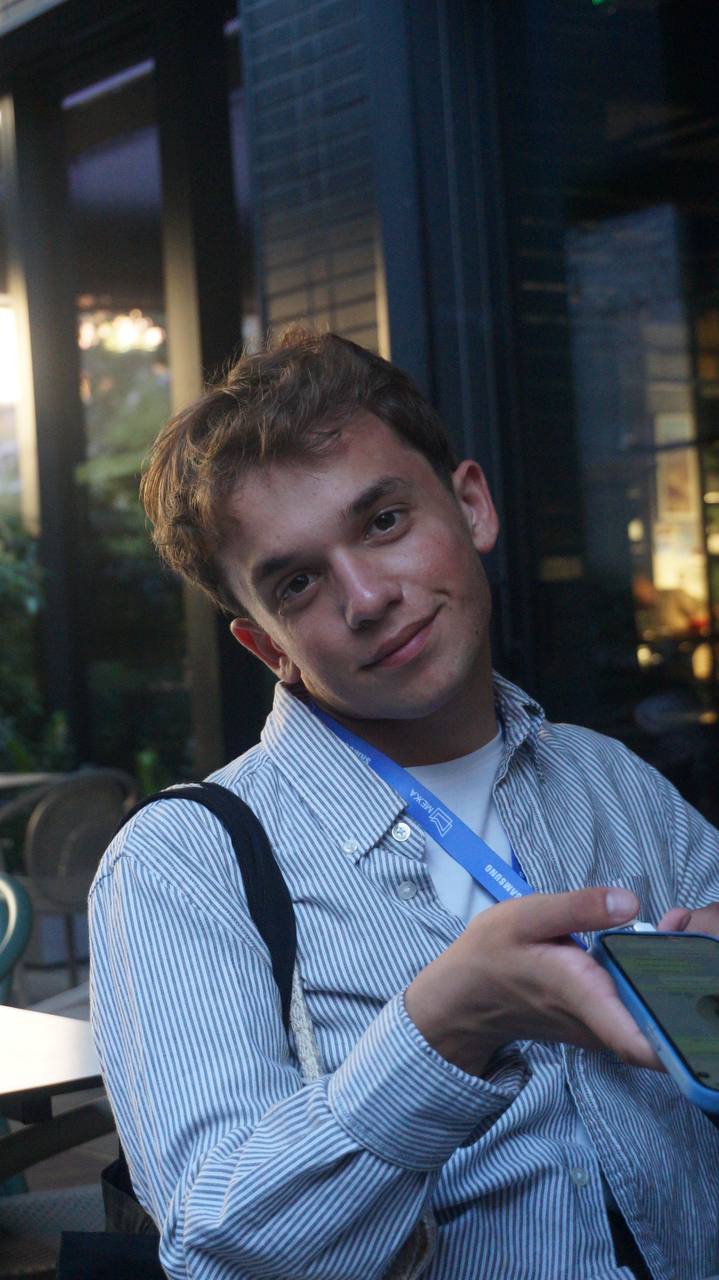






In mid-July, intruders created a fake Telegram channel named after the head of the Main Intelligence Directorate of Ukraine, Kyrylo Budanov. This channel posted a fake post alleging Budanov thanked Ukrainian patriots for the special partisan operation in Crimea. The news was circulated by both Ukrainian and pro-Kremlin media. Later it turned out that Kyrylo Budanov did not make such statements. This Telegram channel continues to exist today. As of July 20, it has 19,400 followers.
The creation of fake Telegram channels by authorities and the military is not new in Ukraine. At the end of 2022, Detector Media discussed a fake Telegram channel of the 46th Airmobile Brigade. A fake Telegram channel was also created for the Ministry of Defense of Azerbaijan. After exposure to "clones" of well-known Telegram channels, they usually continue to exist and publish disinformation. Detector Media analyzed 271 pairs of Telegram channels similar to the most famous channels of Azerbaijan, Armenia, Georgia, Moldova, and Ukraine. Now we can discuss the difficulties faced by those looking for clones in Telegram.
According to a survey by the Opora Civic Network published on July 10, 2023, social networks are Ukraine's primary information source. Among social networks, Telegram channels are chosen by 71.3% of respondents, of which 60% fully trust this messenger and the information published there.
In Azerbaijan, Armenia, Georgia, Moldova, and Ukraine, Telegram is one of the most popular applications on Android and iOS. As of July 16, 2023, according to the SimilarWeb company, which provides information on the popularity of Internet resources, the Telegram application in Azerbaijan ranks 9th among downloads in the Apple Store and 12th in the Google Play Store. In Armenia, it is the 3rd most popular among Apple Store users and the 6th among Google Play Store users. In Moldova, the messenger ranks 7th in downloads among iOS users and 5th among Android owners. In Ukraine, Telegram ranks 6th among iOS users and 3rd among Android users.
Telegram's policies regarding the criteria and procedure for blocking channels in the social network are opaque. Telegram's policy stipulates that the platform moderates several things: violence, drugs, pornography, etc. In practice, moderation is rarely used, while all moderated factors exist in the messenger. The "softness" of such policies has made Telegram a messenger in which propagandists, who have limited the opportunity to work on Facebook, Twitter, and YouTube, spread misinformation.
The existence of Telegram channels that have similar names to the channels of authorities, famous people, and popular Telegram channels is dangerous. After all, with their help, propagandists and criminals can spread disinformation. Moreover, by using the authority of the media, authorities, politicians, experts, bloggers, or the military, they can promote favorable propaganda statements.
How we collected and processed data
The similarity of the names and nicknames of copies of Telegram channels of the media, authorities, and famous people tempts the idea of automating the detection of "clones" of these famous Telegram channels. Computer algorithms allow one to download posts from public Telegram channels, compare texts of any length, break them down into keywords, and translate and highlight the topics of publications. We applied all these tools to detect copies of famous Telegram channels of bloggers, media, and authorities. The hypotheses we tried to test are as follows:
● Clones of well-known Telegram channels, authorities, and media are a common phenomenon;
● Clone Telegram channels distribute some of the posts from the channels they imitate;
● Telegram clone channels spread Russian disinformation more often than non-clone channels;
● There are more Russian propaganda messages among alleged clone Telegram channels than among popular Telegram channels.
For this study, we selected 200 of the most popular Telegram channels from Azerbaijan, Armenia, Georgia, Moldova, and Ukraine in the following categories: blogs, economics and finance, facts, humor and entertainment, law, news and mass media, politics, religion and spirituality, and psychology. To choose these, we focused on the ratings of Telegram channels and how they were categorized by Telemetrio, one of the providers of statistics on Telegram channels, which allowed us to automatically search for Telegram channels in their system and collect the search results for Telegram channels, as they are posted on their web pages.
The choice for analysis of Telegram channels from Azerbaijan, Armenia, Georgia, Moldova, and Ukraine is connected with the fact that all five former Soviet republics have territorial conflicts, which at different times had phases of hostilities, and Russia acted there as a "peacemaker" instead of a party.
According to Telemetrio, 200 Telegram channels in the mentioned nine categories were obtained only for Ukraine and Azerbaijan. In Armenia, 118 Telegram channels fell under these categories, Moldova - 74 and Georgia - 28. In each of the five countries, channels of two categories," news and mass media" and "politics," amounted to about 90% of the 200 most popular.
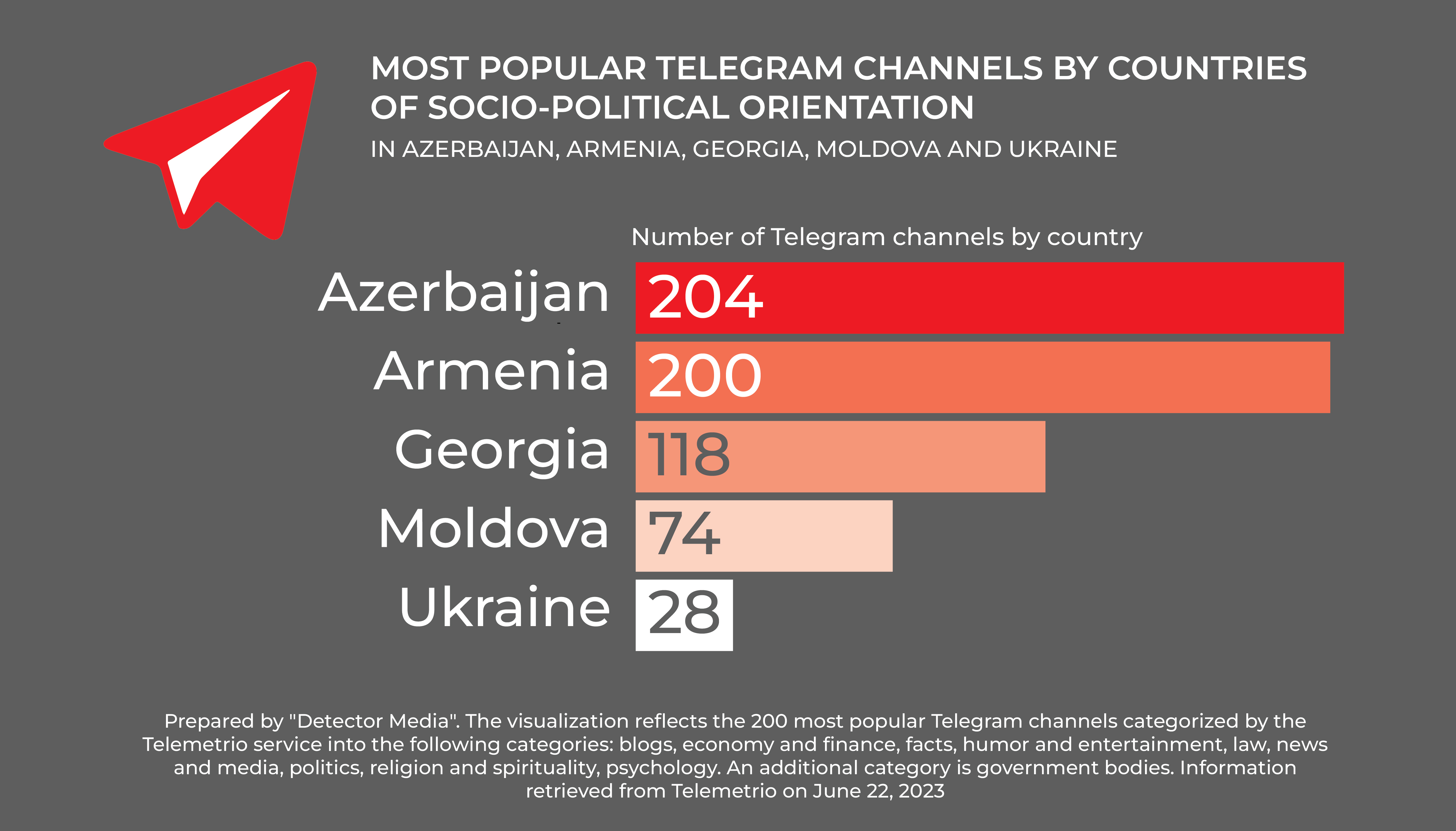
The sample also included 9 Telegram channels of the presidents of the analyzed countries, parliaments, governments, and their leaders. Thus, the initial sample for which we were looking for "clones" consisted of 624 Telegram channels.
The next stage was the search for Telegram channels with similar names and nicknames. By scraping Telegram channels for selected countries that fit the same categories as the channels we focused on, we got another 43,125 similar channels, according to Telemetrio, to the original 624 Telegram channels by name and another 1,032 by nicknames. After discarding private Telegram channels from which posts for comparison could not be downloaded, channels without names and duplicates, and suspected Telegram clone channels, we obtained a sample of 27,588 channels.
Working with tens of thousands of Telegram channel names would take several weeks, and working with all those channels was not necessary. After all, Telemetrio sometimes provides similar Telegram channels — those with several symbols or even one emoji in common with the original Telegram channels. Telegram channels of other categories or channels that worked for audiences from other countries were also given out.
Therefore, we applied computer algorithms to reject random names and nicknames of Telegram channels. For such a task, it is recommended to use algorithms that work with words or their semantics, such as the cosine similarity algorithm or machine learning. However, the names of Telegram channels were often in different languages, and their nicknames were written with "_" signs instead of spaces. Therefore, these algorithms showed "1" for repetitions of Telegram channel names and nicknames from the original list of 624 channels and were collected for similarity comparison. The similarity of the rest of the Telegram channels and nicknames was a "0".
Therefore, we had to focus on the algorithms that compare characters in lines and determine the similarity of texts due to the coincidence of groups of characters in the compared texts. To verify the results, we used two such algorithms that are part of the basic syntax of the Python programming language or its data processing library pandas: SequenceMatcher and Jaccard similarity.
These two algorithms gave many more string similarity steps. A less than 10% similarity meant that Telegram channels and nicknames from the original set of channels and those reported by Telemetrio as similar shared 1-2 letters or emojis. The similarity between 11% and 20% is common small words like "news", "front", and "Islam". A similarity between 20% and 40% meant that the cells being compared shared larger words. For example, names or surnames of bloggers-namesakes or, accordingly, namesakes, titles like "Ayətullah" or polysyllabic words like "official" or names of countries.
Significant and subtle differences in Telegram channel names and nicknames began after 70% similarity. For example, the names of the Telegram channels "BROTHERS IN ARMS" and "Brothers in Arms ✙" («БРАТИ по зброї» / «Брати по Зброї ✙») according to the Jaccard similarity algorithm had 75% similarity, as did the names of the Georgian channels "GEnatsvale Music | Genatsvale Music" and "GEnatsvale | Genatsvale" («GEнацвале Музыка | Генацвале Музыка» / «GEнацвале | Генацвале»). There were also quite a few accidental hits of Telegram channels. But some began to appear, which should be investigated more carefully. So, for the lower limit when selecting Telegram channels, we chose 70% similarity separately for names and nicknames. After discarding duplicates, 1,305 pairs of public Telegram channels were left. For them, we downloaded all publications for May 2023 using the Python programming language library for working with the telethon Telegram. At this unloading stage, it turned out that some channels did not work at all, or there were no posts dated from May.
After downloading the posts, we got 271 pairs of Telegram channels. Of these, 353 channels were not repeated in different pairs. For these 271 pairs of Telegram channels, we searched for identical posts, common topics, Russian propaganda marker words, and Russian media citations.
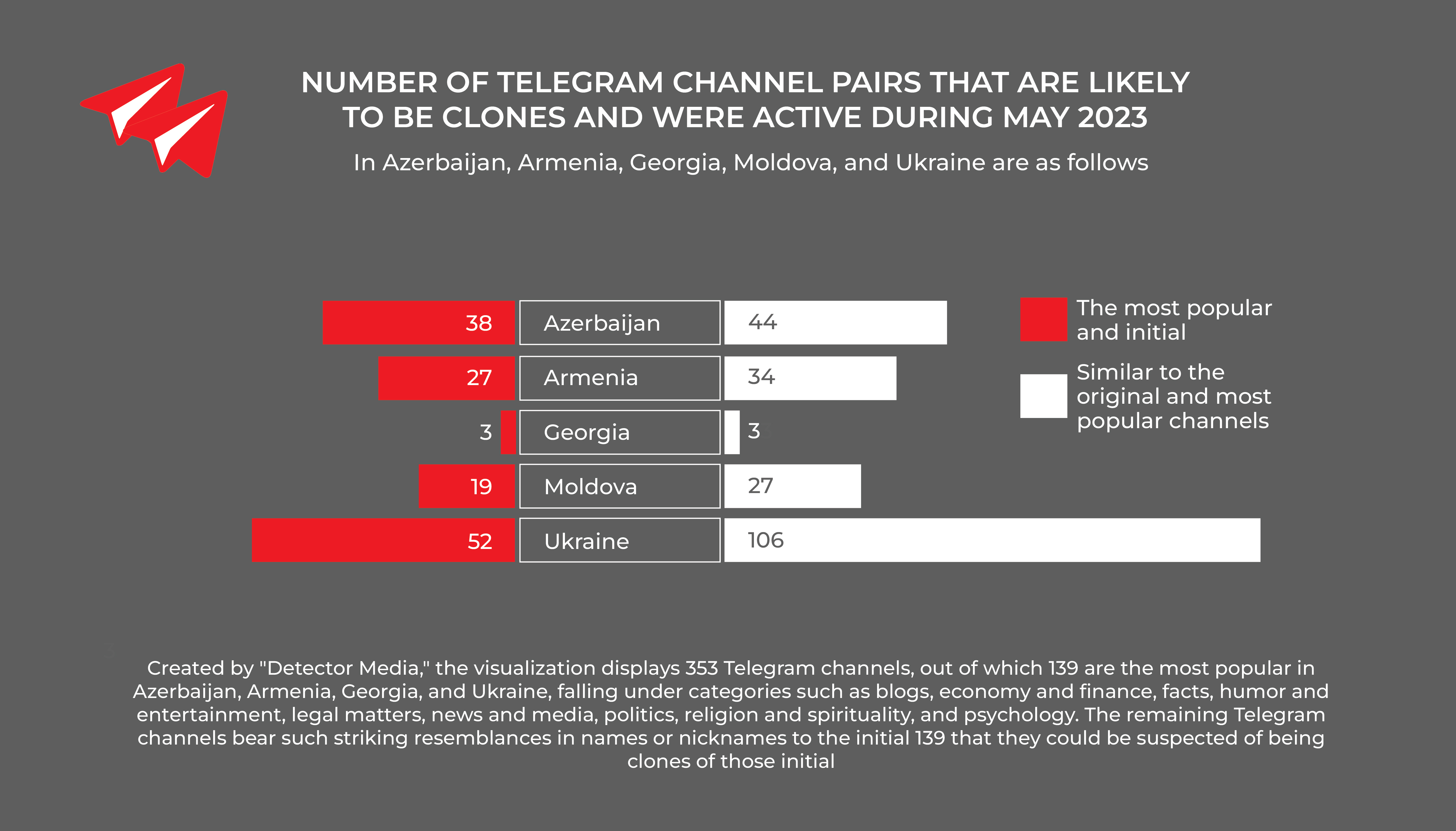
The number of posts we worked with was 222,480. Posts’ number in May, depending on the channel, ranged from one to 8,753. 42 Telegram channels had less than ten posts in May. There were more than a thousand posts on 62 Telegram channels. And the average number of posts for the entire data set of 353 Telegram channels is 631.
Telegram clone channels are not too common, and algorithms find them worse than motivated people
The existence of clones of Telegram channels was most often reported by users of social networks and those who related to the channels, a copy of which was created. People who had experience with the Telegram channels which have been cloned were the most effective at detecting cloned channels. After all, the similarity of a Telegram channel to another in terms of name or nickname does not guarantee that the founders of one Telegram channel deliberately copy others. Centralized detection of copies of Telegram channels is complicated because when naming Telegram channels, they choose commonly used words, geographical names, or currently trending terms. In Ukraine, it is "news" and "war" («новини» / «новости» / «війна»). In Moldova - "Moldavasky", "Moldova", "Novosti", "Kyshinev" («молдавский» / «Молдова» / «новости» / «Кишинёв»). In Georgia - "Georgia", "Gruzia", "Novosti", "Batumi" («Georgia» / «Грузия» / «новости» / «Батуми»). In Armenia - "Armenia", "Artsakh", "church" («Армения» / «Artsakh» / «церковь»). In Azerbaijan - "Azərbaycan", "TV", "xəbərlər", "xəbər", "operativ". These exact words later become the basis of nicknames for Telegram channels.
Verbatim reposting does not necessarily mean an imitation of another Telegram channel
46 Telegram channels out of 271 analyzed pairs had at least one joint post. However, when comparing each post in one channel to each post in the other channel of the pair, on average across countries, duplicate posts occurred most frequently in 0.004% of all pairwise post combinations. The highest rate of copied posts by similar channels was in Ukraine. It was a little more than four-thousandths of a percent. It is because Telegram channels in Ukraine relay messages about air alarms and their cancellation verbatim. In Azerbaijan, Armenia, Georgia, and Moldova, the frequency of word-for-word re-publications ranges from a few ten thousandths to a few hundred-thousandths of a percent.
Reposts did not guarantee that one channel was a "clone" of another. We have highlighted a few more reasons why some Telegram channels copy the posts of others, but at the same time, they are not clones.
First, some companies that develop news Telegram channels create them as networks. One channel covers the country, while others focus on individual settlements, regions, or districts. In Ukraine, this is how the network of news channels "Truha" («Труха») works, for example. Telemetrio reports 104 Telegram channels with the "Truha" in their name, the "lightning bolt" emoji, and a distinctive logo with a yellow border. A few of them, such as Trukha killed by Shariy" («Труха убитая Шарием»), stood out behind logos and could be just copies or attempts to use a well-known brand in Telegram. But now "Trukha killed by Shariy" is blocked in Telegram. Moreover, citations within the "Truha" network channels are associated with reposts of bright local or national news in the network's Telegram channels. Telegram channels that are part of networks forward from each other in 0.1-0.001% of cases.
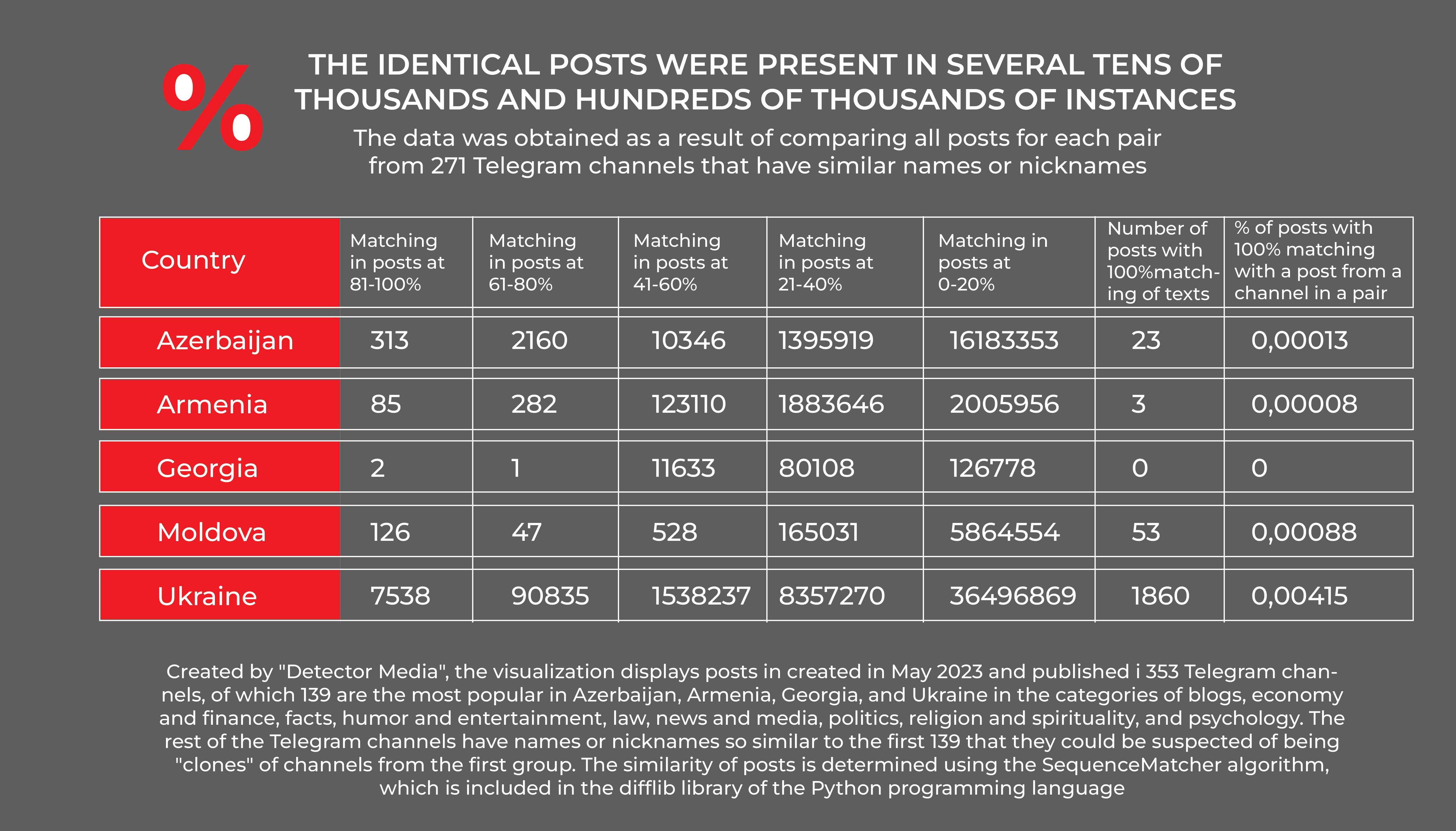
Secondly, authorities also repost each other, and other Telegram channels repost their posts. For example, the Telegram channel "🇺🇦 Kyiv Regional Military Administration" (@kyivoda, «🇺🇦 Київська обласна військова адміністрація») had 16 identical posts in May 2023 with the Telegram channel "Odesa District Military Administration" (odeskarda, «Одеська Районна Військова Адміністрація»). Similar posts on these Telegram channels are due to verbatim quotes or posts of representatives of the executive power or the president.
Thirdly, some bloggers and media make backup channels so that if the main channel is blocked, they can start using the backup channel.
In Azerbaijan, Armenia, Georgia, and Moldova, Russian propaganda media operate without obstacles in Telegram
In 2016, the European Parliament approved a resolution against Russian mass media. The resolution claims that Russia conducts "hostile propaganda" against the EU, and the countermeasures to Russia equate to the fight against ISIS. The Sputnik agency, RT channel, Russkiy Mir Foundation, and the federal agency Rossotrudnichestvo were named the most dangerous Russian mass media. First of all, Sputnik created an extensive network of Telegram channels from these platforms. The main website of Sputnik has 32 branches, in particular in Abkhazia and South Ossetia, the occupied territories of Georgia. The network of Sputnik channels in Telegram is branching out even more. According to Telemetrio, there are about a hundred channels in Telegram with the name "Sputnik" and logos similar in colors and fonts to the logos of the sites of this network.
From the analyzed list of countries, Sputnik has Telegram channels updated daily in all countries except Ukraine. There are 2 Telegram channels in Moldova, one in Russian and the other in Romanian. In Armenia, the Sputnik channel is conducted in Armenian, Azerbaijan, and Georgia - in Russian.
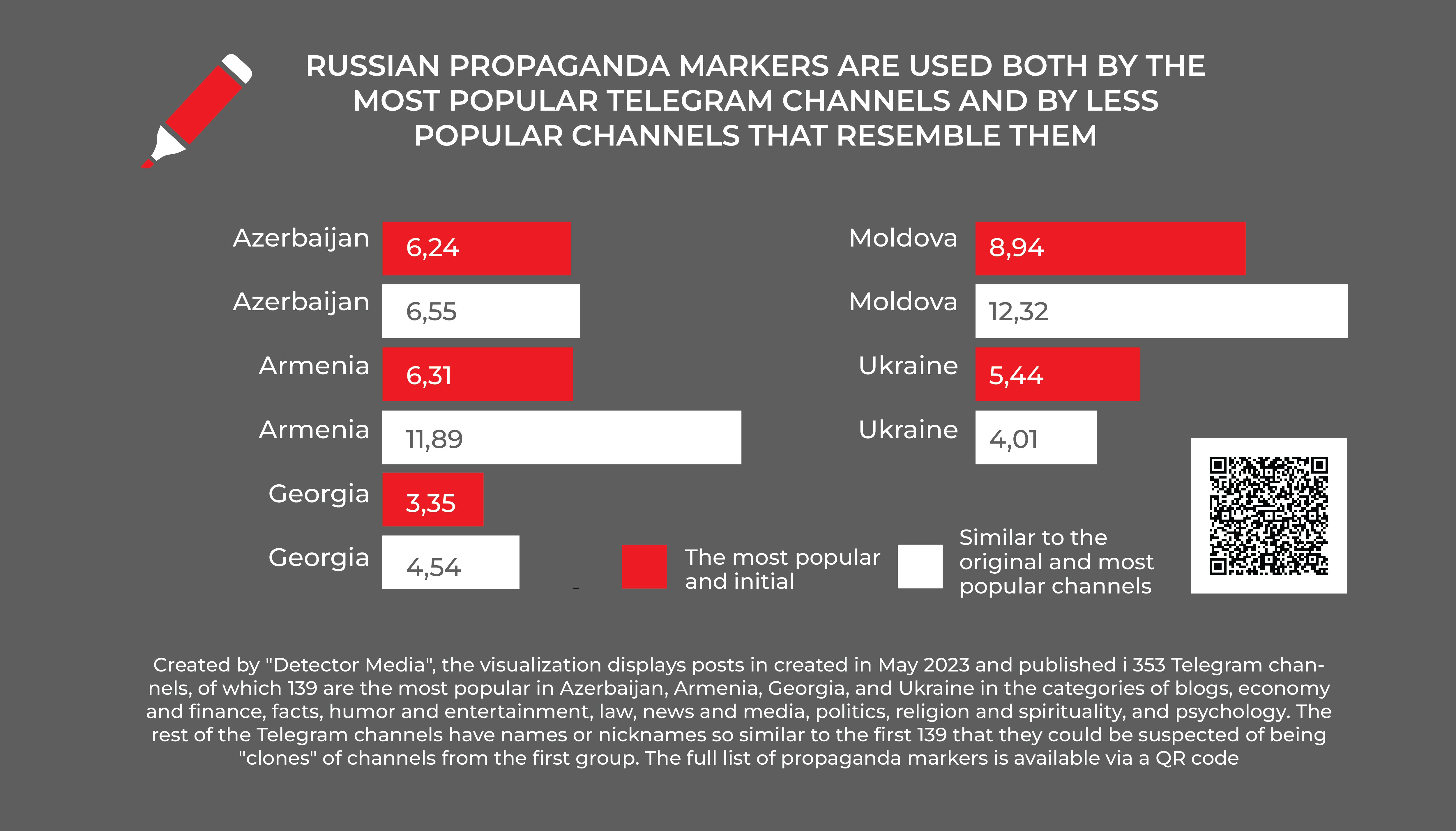
These channels do not duplicate each other's content; each covers primarily the news of the respective country and international events affecting it. The biggest attention on these channels is paid to Russia and the relations of other states with it. The main messages voiced by representatives of the Kremlin, from Putin to the spokeswoman of the Russian Foreign Ministry, Maria Zakharova, are constantly broadcast. The floor is given to local pro-Russian politicians and public figures. For example, the SputnikGeorgia channel published an interview with Konstantin Morgoshii, the founder of the Alt-info («Альт-інфо») organization, which disrupted the LGBT festival in Tbilisi.
"Our goal is to achieve independence from Western lobbyists. And we see the key to normalizing relations with Russia because it is our neighbor, and all problematic issues for the Georgian people must be resolved with its help," Morgoshiya said in an interview.
Ukraine is vital in the narrative of all Sputnik’s Telegram channels network. News about Ukraine and the Russian invasion is broadcast both with adaptation for contexts and with the use of local experts and without. The Georgian Sputnik branch most often attracts locals. There, representatives of the Georgian authorities act as permanent providers of topics for posts. In particular, Prime Minister Iraklii Garibashvili accused Ukraine of preventing Georgia from obtaining EU candidate status.
"The authorities of Ukraine made unjustified and completely unfair decisions. Where do they have the time to concentrate on our internal affairs, and why should they have the motivation to do so? Let them watch over themselves and their country. We act according to our own plan; we do not need advice. When the embassies of other countries left Kyiv, we stayed and defended our interests to the end," said Iraklii Garibashvili, commenting on Kyiv's decision to send the Georgian ambassador out of the country for consultations with the government in Tbilisi.
The Sputnik network has many texts about international politics, Russia's place, and its "enemies". In the Moldovan Sputnik newspaper, Maria Zakharova is quoted warning Chisinau that "the rapprochement with NATO may have negative consequences... the country will not ensure its security and will lose its sovereignty." The Armenian version of Sputnik distorts the decisions of Armenia, China, Kazakhstan, and Brazil, which supported the UN resolution condemning Russian aggression in Ukraine and Georgia. The Armenian Sputnik spread the words of the deputy representative of the Russian mission to the UN, Dmitriy Polyanskyi:
The decision put many countries in an uncomfortable position, fearing that the resolutions they proposed would be blocked if they did not vote for the document. Therefore, Russia's partners from the CIS and BRICS did the following: they did not support the politicized item in a separate vote but voted for the entire text."
All Sputnik branches, from time to time, repost the most "important" messages of Russian propaganda from the Telegram channel named "Sputnik Blizhnee Zarubezhye" («Спутник Ближнее Зарубежье»). For example, they repeated all the "classic" theses of Russian propaganda when they talked about providing Ukraine with depleted uranium ammunition:
"The situation around Ukraine is leading to a new round of conflict. The confrontation is given a qualitatively different dimension. They do not fully understand the consequences of their use. This component also hits those who use this weapon. The British did this against the background of the Russian-Chinese negotiations in Moscow, dedicated to international stability and the preservation of peace," the channel reports the words of Maria Zakharova.
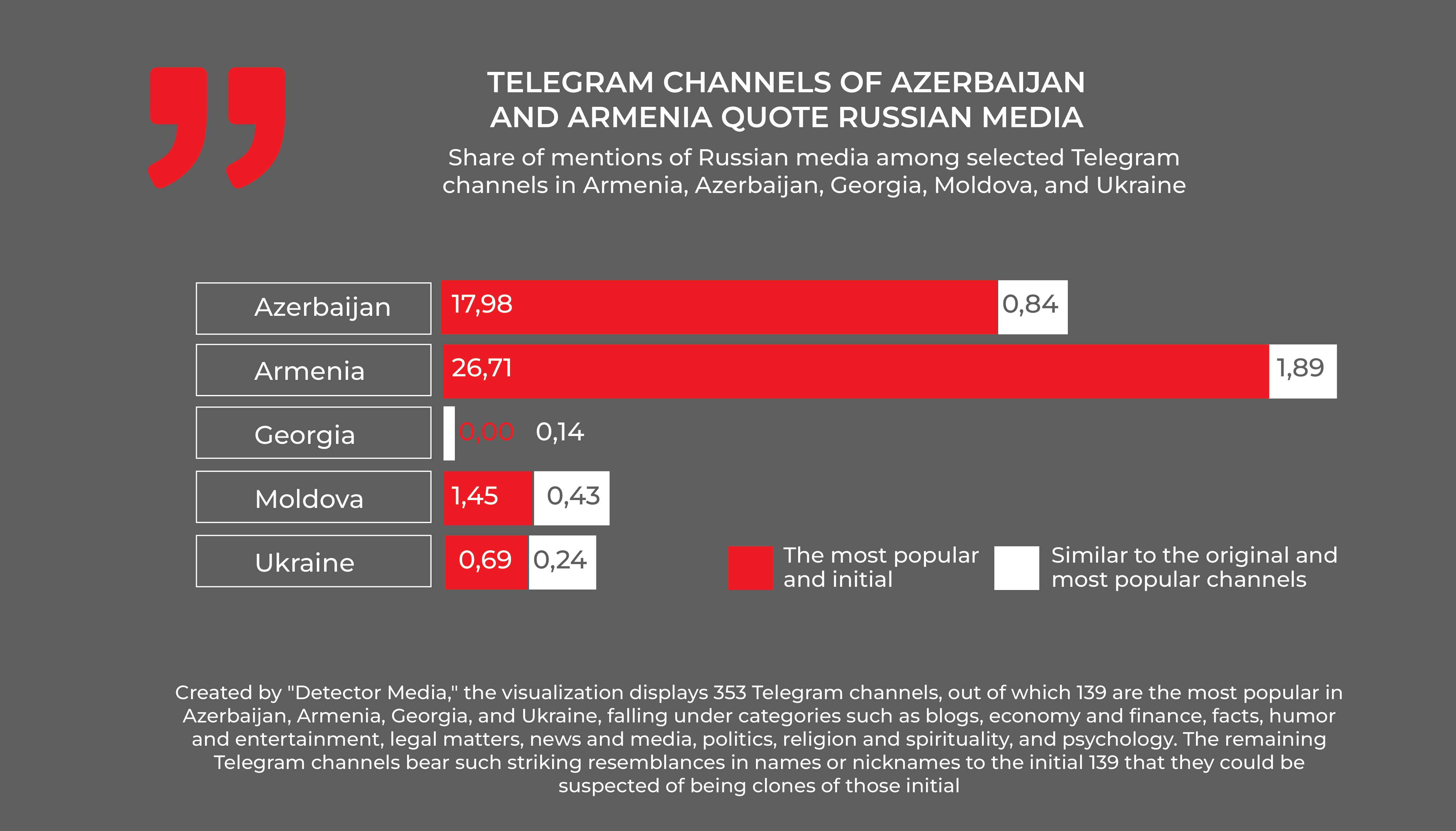
Sputnik’s mentions are the most frequent in the analyzed countries. Russian media cite the most popular Telegram channels relatively more often than likely copycat channels. We established this after searching for mentions and citations in each of the five countries in seven Russian publications: Sputnik, Rossiya 1, Rossiya 24, RIA Novosti, RT, Tsargrad, and Zvezda. In the Telegram channels for which copies were sought, in Armenia, there were mentions of at least one of the Russian publications in almost 27% of the posts, and in Azerbaijan - nearly 18%. In Moldova, the mentioned Russian mass media citations were about 1.5%. While in Georgia and Ukraine - less than 1%.
Telegram clone channels are just a symptom of propaganda prevalence in Telegram
Due to its loose content moderation policy, Telegram remains a platform that promotes the spread of misinformation. According to a report by researchers at Nisos, Russian state propaganda, for example, uses Telegram to distribute video content because of the ability to leave no visible signs that would uncover the video's source. For this, propaganda videos with subtitles in different languages and hashtags for international promotion are uploaded on a separate anonymous Telegram channel – often with the check marks intentionally removed. After that, they are reposted by hundreds of accounts on other platforms — primarily on Twitter, where Russian embassies or state media sometimes use them. It turns out to be impossible to find the source of the video. The videos distributed in 18 languages after the full-scale invasion of Ukraine featured Kremlin conspiracy theories that blamed Ukraine for civilian casualties and claimed that residents of territories annexed by Russia welcomed the occupiers, researchers said.
Telegram is one of those media platforms that help the Russians maintain control over the occupied territories and deliver the information Russia needs to their residents. In December 2022, Detector Media’s analysts published a list of 51 Telegram channels of the occupation authorities created for the territories controlled by the occupiers until February 24, 2022, and another 121, created after the full-scale invasion of the Russians. At a time when the activities of such resources on YouTube, Facebook, and Twitter were blocked, as well as the personal pages of Russian propagandists and collaborators, the Russian social networks VK and OK gave them platforms to work with. The owner of Telegram, Pavel Durov, distances himself from his Russian roots and support for the Russian regime. However, like pro-government Russian social networks, his platform continues to be a place for spreading propaganda and strengthening the power of Russian terrorists.
To reduce the opportunities for misinformation on Telegram, it would be necessary to change its moderation and privacy policies significantly. However, it is difficult to do this without changing the platform's identity, which, since its beginning, has positioned itself as the most anonymous and protected from the intervention of regulatory authorities compared to its competitors. Telegram’s advantages are closely intertwined with its disadvantages. But some things can definitely be made more transparent. For example, Telegram offers different reasons for complaints (reports) about content depending on the platforms on which Telegram is used: Android, Windows, or MacOS.
There is another way to cooperate with Telegram — the pressure of non-democratic regime representatives. Telegram responds to threats of blocking and even concedes pluralism to censorship. Thus, in 2021, Moscow state authorities forced Telegram to block the "smart voting" service and political campaigning on the day of the State Duma elections. And in 2015, Telegram agreed to comply with Iran's laws and restricted Iranians' access to some of Telegram's bots. The founder of Telegram, Pavel Durov, explained the concessions to the Russian authorities with his concern for users: "Allowing Telegram to be blocked for all Russians to give a political party two additional days to campaign after the elections have already begun is like sacrificing a queen for a pawn in a chessboard without a clear winning strategy. For me, the interests of hundreds of millions of Telegram users will always be incomparably more important than the interests of any political force."
On the other hand, Telegram has to coordinate its actions with Apple and Alphabet, online application stores from which the app is mainly downloaded. At their request, the platform blocked pro-Russian propaganda channels that spread calls for violence. So, if the public of Western countries develops unified recommendations and coordinated pressure with the help of technological giants, we can hope to achieve significant reform of Telegram's policies. It could significantly limit the opportunities for misinformation and propaganda on the platform. Of course, it is necessary to maintain a balance and preserve the platform's liberal practices and its autonomy from regulatory authorities. Too harsh an approach will simply lead to the loss of popularity of Telegram and the flow of propaganda practices to other, more profitable platforms for them.


